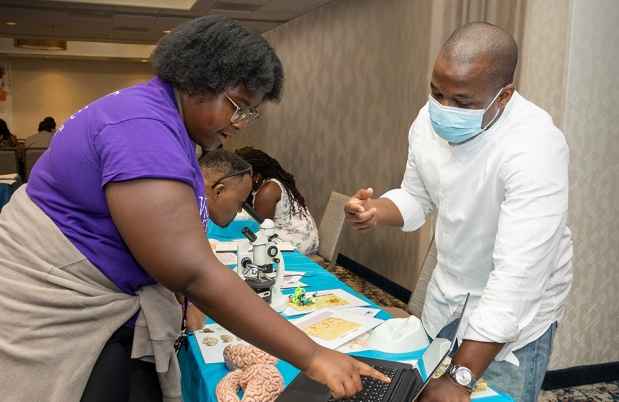They are musicians and librarians, fashion designers, fitness instructors, actors, athletes, and artists. They are sisters and wives, brothers and fathers, from New England and around the nation. What do they have in common? All have been affected by mental illness and its stigma and have been brought together as part of a national public awareness campaign sponsored by McLean Hospital, in collaboration with Boston Logan International Airport and several mental health advocacy groups.
The campaign, Deconstructing Stigma: A Change in Thought Can Change a Life, launched in December 2016 and features larger-than-life photographs of courageous people who have shared their stories with the hope of changing how people with psychiatric illness are viewed.
“Shame and stigma are still far too prevalent when it comes to psychiatric disease and can contribute to the fear and isolation many people feel. Deconstructing Stigma is an unprecedented effort to spark conversation about behavioral and mental health,” said Scott L. Rauch, MD, president and psychiatrist in chief of McLean.
With an initial physical installation at Logan Airport spanning a 235-foot gallery between Terminals B and C, advertising on the MBTA—Boston’s public transit system—a website, a simultaneous social media campaign, and strong interest from the media, Deconstructing Stigma has generated a great deal of attention. In the month following the launch, its website, DeconstructingStigma.org, saw an average of 500 viewers a day, while Twitter, Facebook, and Instagram generated close to two million impressions. The display at Logan Airport is expected to reach more than a million people in 2017.
“When people walk through this gallery, they’re going to see these images and realize that ‘wow, I know someone [with a mental illness],’ or they are going to read the narratives and say ‘oh my, god, that’s me,’” said Darryl “DMC” McDaniels, a participant in the campaign and a founding member of the legendary hip hop group Run-DMC. “This project is going to remove the guilt and shame, and then it’s going to remove the pain.”
Watch the launch of the Boston Logan Airport exhibit
Blending celebrities, such as DMC and comedian Howie Mandel, with everyday people is a key component to the campaign because mental illness does not affect only one demographic or group. In fact, one in five American adults will experience a mental illness this year, and of those living with a psychiatric disorder, three-quarters report experiencing mental health stigma.
“Mental health affects everyone, whether we recognize it or not,” said Thomas P. Glynn, CEO of Massport. “The exhibit, Deconstructing Stigma, is another example of how we are all working together to help our state and country make strides in this area.”
According to one of the architects of the campaign, Senior Director of Public Affairs and Communications Adriana M. Bobinchock, the majority of the volunteers—primarily recruited through Facebook—cited breaking mental health stigma and helping other people know that they are not alone in their struggles with mental illness as the reasons why they wanted to participate in such a large-scale campaign.
“I wanted to help others who struggle with mental illness know that they are not alone,” said Sean Shinnock, the first person to volunteer for the campaign. “I still struggle with obsessive compulsive disorder, anxiety, and depression some days, but I am confident enough, hopeful enough, inspired enough, and motivated enough to be a part of this life.”
Despite the concerns about being labeled and risking further discrimination, the volunteers in this project are sharing their stories of hope and resilience so that the public can have an opportunity to “walk in their shoes” and perhaps step away with a different view of what it’s like to have a mental illness. For Jamie Lenis, a mother of two from New Jersey, the experience of working on the Deconstructing Stigma campaign has had an unexpected effect on her life.
“My participation has allowed me to fully accept myself, my struggles, my triumphs—however small—without a hint of shame anymore,” said Lenis. “For the first time, I feel truly empowered and free. I’m not free of depression or anxiety—not wholly—but I’ve shed their damp blanket. I’m completely open to sharing with others in the hopes that my story can help in any way.”
With participants from across the United States, ranging in age from 16 to 72, representing a wide range of races, religions, and socioeconomic backgrounds, the project took approximately 18 months to complete. Work has already begun on phase two, with a number of airports, museums, universities, and municipalities around the country expressing interest in hosting their own Deconstructing Stigma exhibits.
Media Requests
Journalist or member of the media? We are available 24/7 for media requests.



